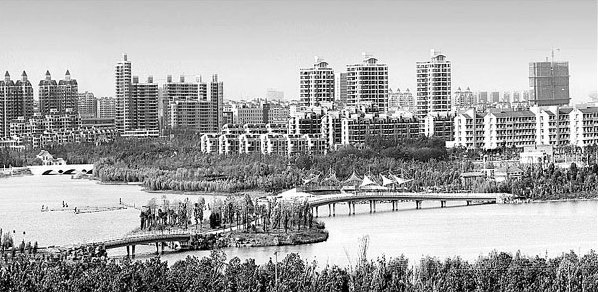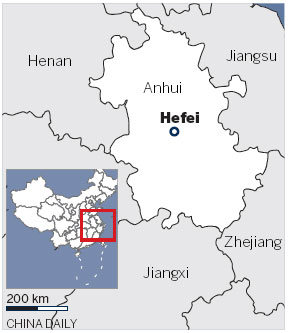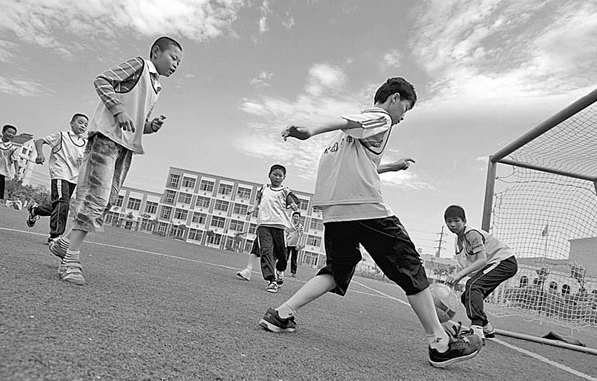|
The once poor center of a mainly rural economy now boasts huge advances in upgrading industries and R&D
It came as no surprise when The Economist magazine named five Chinese cities as the fastest-growing metropolitan economies in the world in 2012. What was unexpected was which they were. Not Guangzhou, Shanghai or Chongqing, but places such as Baotou, Anshan and - topping the list - Hefei, the capital of Anhui province.
Much of this success is due to the Hefei Economic and Technology Development Area set up 20 years ago.
 |
|
Jade Lake in the Hefei National Economic and Technical Development Area. Heifei, the capital city of Anhui province, was named as one of the fast-growing metropolitan economies in the world. Photos provided to China Daily
|
Hitachi Construction Machinery Co from Japan, one of the area's first tenants, set its China headquarters there, which is rarely seen among multinational companies who usually choose the economic or political center of a country.
Urbanization and industrialization have created several cities in China comparable with Western capitals, but the growing cost of land, heavy traffic and rising labor costs make them less competitive as production bases. Neighboring India and Vietnam are catching up in that respect.
However, China still remains the world's manufacturing hub. Its urbanization drive has created new cities that are eminently suitable for industry transfer. Hefei is one such city.
Eleven years ago, Unilever Plc, one of the world's leading consumer goods suppliers, moved its manufacturing base from Shanghai to Hefei Economic & Trade Development Area.
Industry sources say Unilever's production costs were cut by at least 40 percent when it moved to Hefei. This has helped keep its product prices competitive in the Chinese market.
Zeng Xiwen, vice-president of Unilever North Asia, told China Business newspaper how the company came to choose Hefei, even though it has considered building its plants in cities that have well-developed economies, such as those in the provinces of Zhejiang and Jiangsu near Shanghai.
When Zeng went to Huzhou, in Zhejiang, he was surprised when officials there said that if a large Unilever plant came to the city, dormitories would have to be built for its employees. Later he learned that most of the workers in Huzhou were migrants from Anhui province. Why not site the plant there, he thought.
The Hefei plant has grown into the largest production base for Unilever worldwide, says Harish Manwani, its chief operating officer.
Unilever has a long history in China. As early as 1920s, Lever Brothers set up a company producing soaps in Shanghai. Its Lux brand has been a household name ever since.

But it is only in the past decade that the company has seen its Chinese business boom partly because of the move to Hefei. With raw material and labor costs increasing, other foreign and domestic companies are following suit.
Currently, there are dozens of inland economic and technological development zones in China, with advantages in land and labor, to welcome new companies and those transferring operations.
Hefei Economic & Trade Development Area was opened in 1993 and now ranks 13th among the country's 131 national zones of its kind.
"A solely preferential policy has no longer been the magic key for attracting investors," says Yao Weidong, Party chief for the area.
In December 2012, LCFC (Hefei) Electronics Co Ltd, a joint company of Lenovo Group Ltd and Compal Electronics Inc, was set up in record time in the area. From signing to production, the plant covering an area of 400,000 square meters was completed within 14 months.
Yang Yuanqing, CEO of Lenovo, acknowledged it was "the support of local government that helped create such a miracle".
"Aiming for better development, many investors come to us," says Yao. "If the government is not efficient enough, the operating cost of enterprises will increase.
"We have made a study on corporate investment behavior. Cost is the major factor affecting investment and it can be divided into two parts: setting up and operation. Wise investors will choose somewhere that is cost-effective in both parts."
Seated in the southern suburbs of Hefei, Hefei Economic & Trade Development Area is the "bridgehead" of Anhui's opening-up. By the end of 2012, there were 1,275 enterprises in the zone, of which 340 were foreign-funded. The Foreign Direct Investment in the first half of 2013 was $313 million.
Equipment manufacturing, household appliances, motor vehicles and parts and consumer goods are the four main industries represented. Haier, Mitsubishi Heavy Industries Ltd, Gree International Inc, Jianghua Auto Group Co Ltd, Navistar International Corp, ABB Group Corp, NIPRO Ltd and Kao Corp are also among those located in the zone.
"Hefei Economic & Trade Development Area is established on the foundation of large-scale mechanized industry, and consolidated by high-tech industry," Yao says.
In 1995, Hitachi Construction Machinery set up a plant in the zone, with an output of 300 machines in the first year.
Although recent years have seen a slowdown in expansion, it remains the highest-performing overseas branch of Hitachi, with an output value of 10.6 billion yuan ($1.74 billion) in 2012. It is estimated that the value will be more than 20 billion yuan by 2015.
Because of Hitachi's performance, Hefei is now known as the world's largest producer of excavators.
geman@chinadaily.com.cn
 |
|
Students play football in the Hefei Economic and Technology Development Area, which ranks 13th among China's 131 national zones of its kind.
|
|